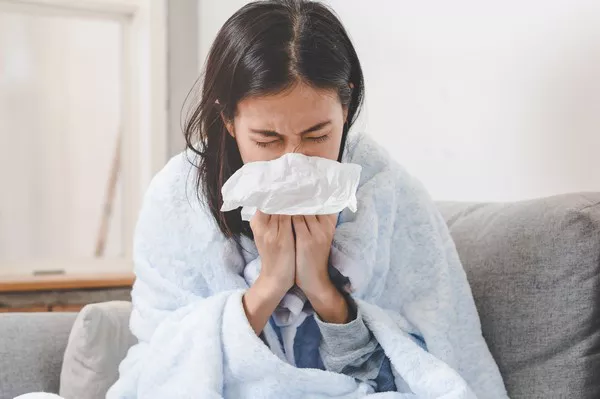Sneezing is a common and natural bodily response, usually triggered by irritants in your nasal passages or throat. While occasional sneezing is perfectly normal, frequent or persistent sneezing can be bothersome and disruptive. It’s essential to identify the underlying causes of your sneezing and explore effective remedies to alleviate this reflex. In this comprehensive guide, we will delve into the reasons behind frequent sneezing and provide you with practical strategies and remedies to stop the sneezing fits.
Understanding Sneezing: The Why and How
Sneezing is your body’s way of clearing irritants from your nose or throat. When your nasal passages or throat detect something irritating, such as dust, pollen, pet dander, or smoke, your brain sends a signal to expel it forcefully. This sudden expulsion of air through your nose and mouth helps remove the irritant and protect your respiratory system.
While sneezing is typically a protective mechanism, it can become excessive and uncomfortable. Frequent sneezing can occur for various reasons, including:
1. Allergies: Allergic reactions to pollen, dust mites, pet dander, mold, or other allergens can trigger sneezing. This type of sneezing is often accompanied by other symptoms like a runny or stuffy nose, itchy eyes, and throat.
2. Viral Infections: Common colds and respiratory infections caused by viruses can irritate your nasal passages and lead to sneezing. These sneezing episodes may also be accompanied by a sore throat, cough, or fever.
3. Environmental Triggers: Environmental factors, such as exposure to strong odors, smoke, pollution, or temperature changes, can induce sneezing.
4. Irritants: Irritating substances like cleaning products, chemicals, or strong fragrances can lead to sneezing fits, especially if you have sensitivities to these triggers.
5. Vasomotor Rhinitis: This non-allergic form of rhinitis is characterized by chronic sneezing and a runny nose. It often occurs due to changes in temperature, humidity, or air quality.
6. Medications: Some medications, particularly those used for blood pressure regulation, may cause sneezing as a side effect.
Effective Strategies to Stop Sneezing
To stop frequent sneezing, it’s crucial to address the underlying cause. Here are practical strategies and remedies to help you find relief:
1. Identify Allergens: If allergies are the culprit, identify the specific allergens triggering your sneezing. Common allergens include pollen, pet dander, mold, and dust mites. Once identified, take steps to minimize your exposure to these allergens:
Use High-Efficiency Particulate Air (HEPA) Filters: Install HEPA filters in your home’s HVAC system to trap allergens.
Regular Cleaning: Frequently clean your home, including vacuuming carpets, washing bedding in hot water, and dusting surfaces.
Allergy-Proof Bedding: Invest in allergy-proof mattress and pillow covers to prevent dust mites from accumulating.
Limit Outdoor Exposure: Check local pollen forecasts and stay indoors during peak pollen seasons.
2. Over-the-Counter (OTC) Allergy Medications: Consider OTC antihistamines or decongestants to manage allergy-related sneezing. These medications can help reduce sneezing, nasal congestion, and other allergy symptoms. Always follow the recommended dosage and consult a healthcare professional if you have any concerns or underlying health conditions.
3. Nasal Irrigation: Nasal irrigation with a saline solution can help remove irritants from your nasal passages and reduce sneezing. You can use a neti pot or a saline nasal spray for this purpose. Ensure you follow proper hygiene and use distilled or boiled water when performing nasal irrigation.
4. Allergy Shots (Immunotherapy): If allergies are severely impacting your quality of life, consult an allergist about allergy shots. Immunotherapy can desensitize your immune system to specific allergens over time, reducing your allergic reactions and sneezing.
5. Stay Hydrated: Drinking plenty of water helps keep your mucous membranes moist and can ease irritation in your throat and nasal passages. Proper hydration can also help thin mucus, making it easier to expel irritants.
6. Avoid Irritants: Minimize exposure to irritants that trigger sneezing. If strong odors or chemicals provoke your sneezing, use well-ventilated spaces or wear a mask when necessary.
7. Steam Inhalation: Inhaling steam from a bowl of hot water can soothe your nasal passages and provide temporary relief from sneezing. Adding a few drops of essential oils like eucalyptus or peppermint can enhance the benefits.
8. Humidifier: Using a humidifier in your bedroom can add moisture to the air, preventing dryness in your nasal passages. This can reduce sneezing, especially during the night.
9. Allergy-Friendly Diet: Some individuals find relief from allergies and sneezing by adjusting their diet. Certain foods, such as those rich in vitamin C and quercetin (found in apples, onions, and green tea), may have natural antihistamine properties.
10. Consult a Healthcare Professional: If your sneezing persists or worsens despite trying home remedies and OTC medications, consult a healthcare professional. They can assess your condition, conduct allergy tests if necessary, and recommend prescription medications or other treatments tailored to your needs.
Conclusion
Frequent sneezing can be disruptive and uncomfortable, but it’s essential to address the underlying causes to find effective relief. By identifying allergens, using OTC medications, practicing good hygiene, and exploring home remedies, you can reduce sneezing and improve your overall well-being. Remember that everyone’s triggers and responses to treatments may vary, so consult a healthcare professional if you need personalized guidance on managing your sneezing symptoms.


